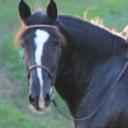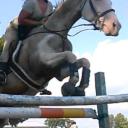Yahoo Answers is shutting down on May 4th, 2021 (Eastern Time) and the Yahoo Answers website is now in read-only mode. There will be no changes to other Yahoo properties or services, or your Yahoo account. You can find more information about the Yahoo Answers shutdown and how to download your data on this help page.
Trending News
Inappropriate voice commands?
We train to voice, using mostly the traditional words, and are particularly careful that WHOA should mean "Stop!" and never mean "Slow down." We try to avoid use of popularly known noises such as giddy-up or clucking so that bystanders won't control our horses.
Sometimes we spell T-R-O-T or W-H-O-A to avoid giving a command in the course of conversation. Still, people nearby will sometimes shout commands at our horses or ponies, often echoing a command we've just given.
Here's an inadvertent command:
http://www.gocomics.com/phoebe-and-her-unicorn/201...
Anyone have stories of inappropriate voice commands, either by riders or bystanders, and how best to overcome, avoid, or prevent them?
8 Answers
- zephania666Lv 76 years agoFavorite Answer
I train my horses to listen to voice commands, but only mine or their rider's, and only when they hear their name first. It's easy. You have people stand around the arena and shout commands to your horse, and you keep his attention on you. You get an "announcer" to call out the gaits, but you don't do them. Never had a problem.
On the contrary, it's saved me sometimes. Once I put my 4 year old nephew on my son's barrel horse. She was a fantastic little Arabian mare, you could trust her with anyone; on barrels she was fast and eager. I walked along beside the 4 year old, who had promised to stay by me. Suddenly he saw his older brothers and cousins across the field, and wanted to join them, so he turned her to face them and dug his heels in. While pointed straight at a barrel. She knew what that meant, and took off like a shot. I yelled MO! Whoa! and she stopped dead in her tracks. Nephew clung like a monkey. But he was safe, his mother took him off the horse and marched him off. He never did it again.
Loved that little mare. She died a few years back, at the age of 32. One of my all-time favorites.
- 6 years ago
My horse was trained to the voice commands before I got him. When I was trying him out I would get nervous cantering and start getting all frazzled and the owner just kept telling me "talk to him talk to him, all you have to do is talk to him" i haven't had a problem with him, even when people are trying to get me to canter when I'm not ready, he will not go unless I tell him. He's also trained to the leg and can read me. If I ask him to canter with my leg and voice if I'm not sure he won't go. Never had a problem. I know some horses who do learn the commands and listen to any one but as long as they only listen to the rider
- ?Lv 56 years ago
That's one of the reasons I don't use my voice, at all, to tell a horse what I'd like him to do, Plus, I find it rather anthropomorphic.
A few years ago, I was starting the horse pictured in my avatar. We were working in the round pen while a couple of people were watching. During a break, one of the people asked me why I was so quiet, because others are always working their horses saying, "walk, trot, canter, whoa, and so on." My response was' " This horse doesn't understand English, but he does understand intention."
- SabrinaLv 76 years ago
Good question. The worst issue I've had with this was when I would take group lessons. The appaloosas I rode when I was a kid were very well trained in voice commands, and often times, my instuctor would give me an instruction, but the horse would respond before I had the chance to ask for it myself. She eventually would just tell her students to "C-word" or "T-word", instead of saying the word itself, to avoid giving the cue. I would also have trouble if another rider were smooching or clucking to try to get their horse going, and then my horse would respond instead.
In recent years, I've been doing less and less with voice commands and more with body language. On the ground I use subtle visual cues, which can be reinforced with voice commands. In the saddle, I've been focusing on communication through seat and leg positon and weight distribution, before I resort to other methods. I find that this helps keep the horse's attention on me, and my body. My horse is still voice trained with the standard "ho", "walk", "trot", and "canter", but because I use body language as my primary method of communication, I find that she holds her focus better on me and is less likely to respond to what other people are doing or saying around us.
- BecLv 76 years ago
I only ride as lessons so all the horses/ponies hear "prepare to trot, and trot on" etc all the time so they know what they mean but also are mostly switched off to them. They rarely respond to a command to speed up (prepare to trot and trot on) but if we are in trot and it's "prepare to walk" half the time they fall out of trot because they know we are going to walk. So once out of beginner lessons we will pick up trot again and keep doing so until all horses remain in trot until the walk command is given (again, most of that is done by the horse hearing walk rather than the rider). But it doesn't work if they bomb off - saying walk does nothing (it's just the routine of prepare to walk and walking).
I use my voice more for me though - especially on lazy horses. I squeeze (backed up if needed with kick/whip) and urge "trot, come on, trot!" and then usually a "keep going, keep going, in the corner, keep going" - I find it helps me use the right part of my body (be it more inside leg, more rein, whip) because I'm consciously thinking of what I need to do. I also "psssshhht" at the lazy one I'm riding as that seems to work quite well.
But it does annoy me when parents watch and if their child is struggling to get the horse moving, the parent starts clucking and pshting from the gate - let all voice commands come from the rider and the rider alone.
- 6 years ago
My horse likes to go from 0 to 60 and people would cluck or kiss he would take off so now I talk to him in German. "Mach Schnell" means go faster so I use that for his 0 to 60. Tanze means dance I use it for trot setz means sit but it's such a calm word I use it for collection. And etc
- Anonymous6 years ago
maybe he doesnt like you








